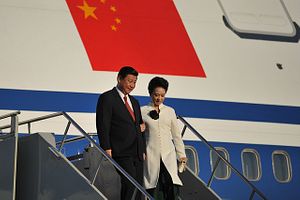Plans for a China-led Asian Infrastructure Investment Bank (AIIB) have proved divisive. As a potential competitor to the World Bank and the International Monetary Fund (IMF) it has not been welcomed by the United States, which still dominates both institutions.
And for good reason. China is not a democracy and it’s expansionist policies from the South China Sea to Central Asia and Africa have hardly endeared Beijing to its neighbors near and far. It also wants a 49 percent stake in the bank, leaving 30-odd not-so insignificant countries with minority holdings and a minor say.
Nevertheless momentum is building ahead of its March 31 deadline for founding members, particularly after Britain said it would join the AIIB along with France, Germany and Italy, claiming that it was in the national interest. Other European countries are expected to follow suit.
Australia, a staunch U.S. ally with historical ties to Britain, is likely to follow suit after Prime Minister Tony Abbott noted in the Australian media that “the UK has indicated an intention to sign up for the negotiations, the New Zealanders before Christmas signed up for the negotiations, the Singaporeans likewise, the Indians likewise.
“We’re looking very carefully at this and we’ll make a decision in the next week or so.”
Malaysian Finance Minister Ahmad Husni Mohamad Hanadzlah is also insisting the 10-members of the Association of South East Asian Nations (ASEAN) will fully co-operate with Beijing’s desire to take it’s foreign lending capacity to another level.
The united front followed an inaugural meeting of ASEAN finance ministers and central bankers over the weekend, but given the extent of animosity between China, Vietnam and the Philippines any shared regional vision will be strictly financial.
Vietnamese sources have stressed they have serious reservations about the AIIB and any involvement should not be construed as approval by Hanoi for projects it does not see as fit for its own foreign policy agenda.
It’s an antagonism that Beijing has always attempted to maneuver around by claiming that it lends and gives without any political strings attached – unlike Western institutions where foreign aid and soft loan diplomacy are traditionally tied to good governance.
But the standard Beijing boast is a well-established fallacy within diplomatic circles – particularly in countries like Cambodia – and hardly relevant in shoring-up AIIB membership.
Fear of missing out is a powerful force behind closed doors, where big companies will lobby for AIIB contracts ranging from railways and bridges to dams, highways and electricity grids. Four years ago the Manila-based Asian Development Bank estimated Asia needed about $750 billion a year until 2020 for its infrastructure requirements.
As a comparison the World Bank lent about $25 billion in 2011 for infrastructure spending, representing about half of its lending capacity.
This was point not lost on the Australian Industry Group, which is lobbying the federal government to push ahead with joining the AIIB, saying it would make Australia an active participant in a changing economic landscape within the region as opposed to being just another bystander.
That leaves the U.S., Japan and South Korea as the lone major countries opposed to the $50 billion bank and its promises of funding major infrastructure projects around the region and beyond.
Following the decision by European countries to sign up, Washington urged countries – perhaps in a message to a wavering Australia – to think twice before joining.
“I hope before the final commitments are made, anyone who lends their name to this organization will make sure that the governance is appropriate,” U.S. Treasury Secretary Jack Lew said.
One genuine concern will be standards of governance, construction and human rights when big contracts are awarded. It’s a theme ASEAN countries tend to ignore, but it has been cited by Australia and the Europeans. Of course, whether their voices will be heard among the many minority stakeholders is another matter entirely.
Luke Hunt can be followed on Twitter @lukeanthonyhunt

































